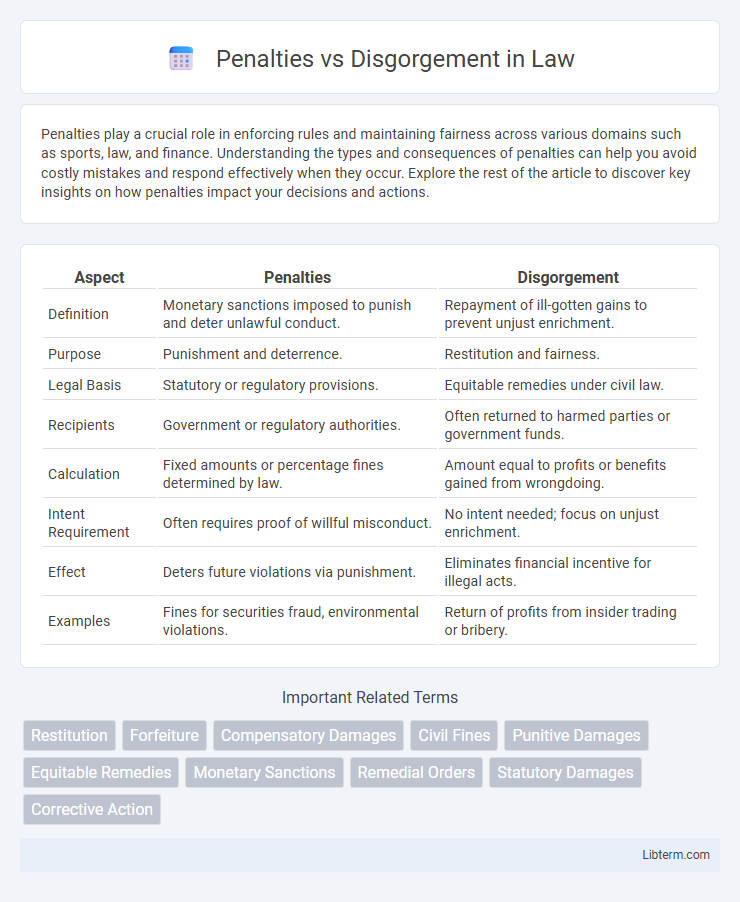Penalties play a crucial role in enforcing rules and maintaining fairness across various domains such as sports, law, and finance. Understanding the types and consequences of penalties can help you avoid costly mistakes and respond effectively when they occur. Explore the rest of the article to discover key insights on how penalties impact your decisions and actions.
Table of Comparison
| Aspect | Penalties | Disgorgement |
|---|---|---|
| Definition | Monetary sanctions imposed to punish and deter unlawful conduct. | Repayment of ill-gotten gains to prevent unjust enrichment. |
| Purpose | Punishment and deterrence. | Restitution and fairness. |
| Legal Basis | Statutory or regulatory provisions. | Equitable remedies under civil law. |
| Recipients | Government or regulatory authorities. | Often returned to harmed parties or government funds. |
| Calculation | Fixed amounts or percentage fines determined by law. | Amount equal to profits or benefits gained from wrongdoing. |
| Intent Requirement | Often requires proof of willful misconduct. | No intent needed; focus on unjust enrichment. |
| Effect | Deters future violations via punishment. | Eliminates financial incentive for illegal acts. |
| Examples | Fines for securities fraud, environmental violations. | Return of profits from insider trading or bribery. |
Understanding Penalties and Disgorgement
Penalties are monetary fines imposed as punishment for violating laws or regulations, aiming to deter future misconduct by creating financial consequences for the wrongdoer. Disgorgement requires the return of ill-gotten gains to prevent unjust enrichment, focusing on restoring the status quo rather than punishing the offender. Understanding the distinct purposes and legal frameworks of penalties versus disgorgement is crucial for compliance and legal strategy in regulatory enforcement.
Legal Definitions: Penalties vs Disgorgement
Penalties refer to monetary fines imposed as punishment for violating laws or regulations, designed to deter future misconduct and enforce compliance. Disgorgement requires the return of ill-gotten gains obtained through unlawful activities, aiming to prevent unjust enrichment rather than punish the wrongdoer. Legally, penalties serve a punitive function, while disgorgement is a remedial remedy focused on restoring financial equity.
Objectives Behind Penalties and Disgorgement
Penalties aim to punish wrongful conduct and deter future violations by imposing financial consequences that exceed the amount gained from the misconduct. Disgorgement focuses on restitution, requiring wrongdoers to return ill-gotten gains to prevent unjust enrichment without serving as a punitive measure. The objectives behind penalties emphasize retribution and deterrence, while disgorgement stresses equity and restoration of the status quo.
Key Differences: Enforcement Mechanisms
Penalties are monetary sanctions imposed to punish and deter violations of laws, often calculated based on the severity and frequency of the offense, with enforcement mechanisms including regulatory agencies and courts that impose fines or other punitive measures. Disgorgement requires the wrongdoer to repay ill-gotten gains obtained through unlawful conduct, focusing on restitution rather than punishment, enforced by agencies like the SEC or through civil litigation to recover unjust enrichment. Enforcement of penalties typically aims at deterrence and punishment, while disgorgement centers on depriving offenders of profits derived from misconduct, reflecting distinct legal objectives and procedural approaches.
Case Studies: Penalties in Regulatory Actions
Regulatory actions often impose penalties to deter non-compliance, as seen in the 2015 Volkswagen emissions scandal where the company faced $2.8 billion in criminal fines for deception. In contrast, disgorgement aims to recover ill-gotten gains, exemplified by the SEC's action against Goldman Sachs in 2010, which resulted in $550 million returned to investors. These case studies highlight how penalties serve punitive and deterrent purposes, while disgorgement focuses on restitution and preventing unjust enrichment.
Case Studies: Disgorgement in Civil Proceedings
Disgorgement in civil proceedings serves as a remedy requiring wrongdoers to surrender ill-gotten gains, distinguishing it from punitive penalties aimed at punishment. Notable case studies, such as SEC v. Liu (2019), highlight how courts enforce disgorgement to prevent unjust enrichment without imposing criminal sanctions. These cases underscore the legal emphasis on equitable restitution over retributive fines in securities law violations.
Impact on Organizations and Individuals
Penalties impose financial burdens on organizations and individuals that often exceed the amount gained from wrongdoing, serving as a deterrent to future misconduct and harming reputations. Disgorgement requires return of ill-gotten gains, restoring losses without punishing beyond restitution, which may limit its impact on deterring harmful behavior. The choice between penalties and disgorgement influences corporate governance, risk management strategies, and individual accountability within regulatory and legal frameworks.
Judicial Trends: Penalties vs Disgorgement
Judicial trends increasingly distinguish penalties from disgorgement by emphasizing disgorgement's remedial purpose to prevent unjust enrichment rather than to punish. Courts often require disgorgement to be closely tied to actual gains directly obtained from wrongdoing, avoiding punitive overreach. Penalties, conversely, serve as deterrents and are subject to constitutional limits on excessive fines under the Eighth Amendment.
Debates on Effectiveness and Fairness
Penalties and disgorgement serve distinct roles in enforcement, with penalties aimed at punishment and deterrence, while disgorgement focuses on stripping ill-gotten gains to restore fairness. Debates on their effectiveness center on whether penalties truly deter misconduct or merely impose financial burdens without rectifying harm, whereas disgorgement's fairness is questioned due to challenges in quantifying unjust enrichment accurately. Legal scholars argue that an optimal regulatory framework balances punitive measures and equitable recovery to enhance compliance and restore market integrity.
Future Outlook: Evolving Legal Framework
The future outlook for penalties versus disgorgement highlights a shifting legal framework increasingly emphasizing disgorgement as a key remedy for regulatory enforcement, driven by its focus on preventing unjust enrichment. Courts and regulators are refining criteria to distinguish punitive penalties from equitable disgorgement, ensuring remedies align with evolving compliance priorities and corporate accountability standards. Emerging statutory amendments and judicial interpretations suggest a trend toward greater clarity and consistency in applying these remedies across securities, antitrust, and consumer protection laws.
Penalties Infographic

 libterm.com
libterm.com